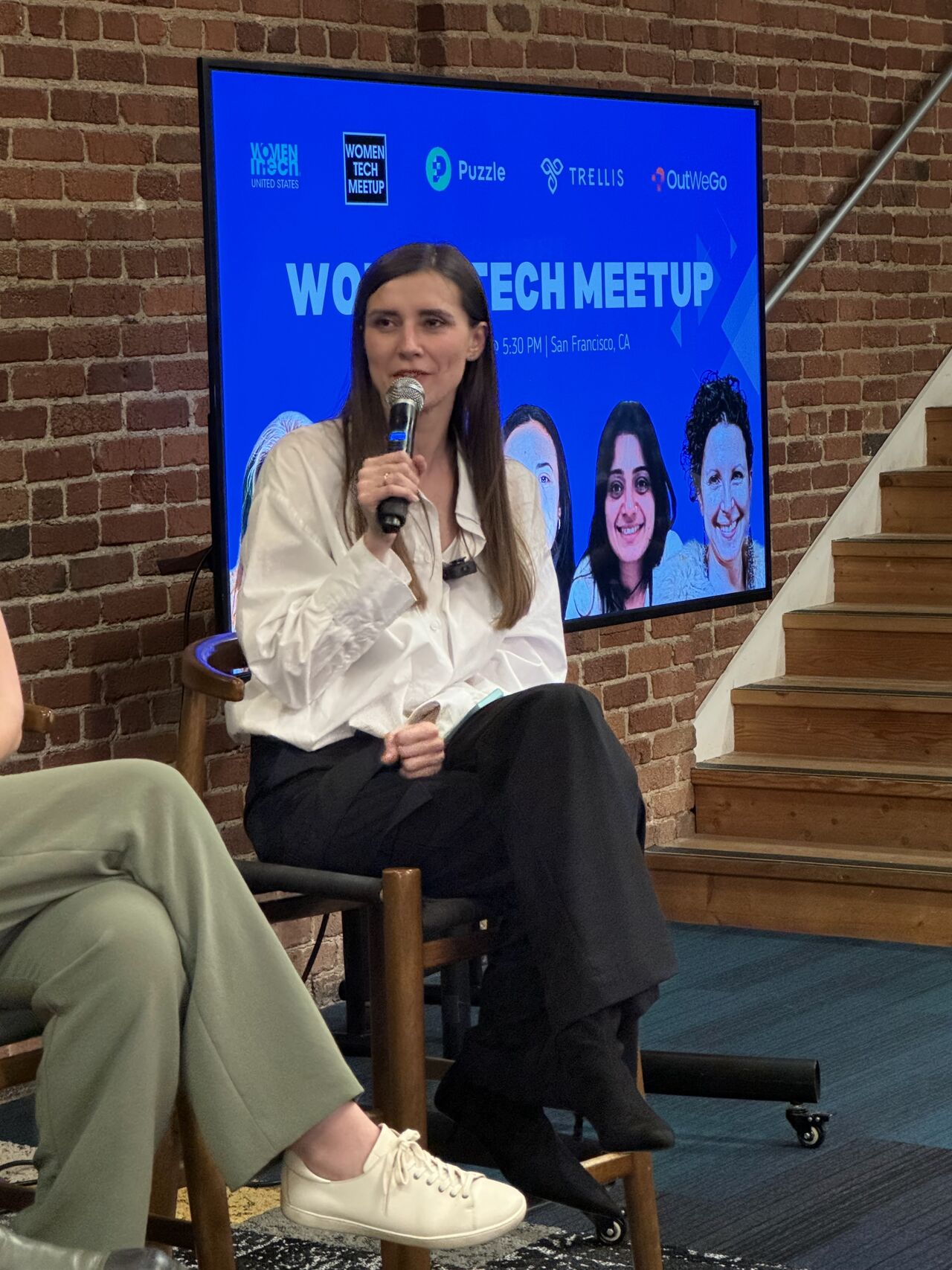
Tech Talent Spotlight Series: Dasha Shunina
01 May, 20248 minutesDasha Shunina is the Founder of Women Tech Meetup, a regular monthly event held in San Franc...

Dasha Shunina is the Founder of Women Tech Meetup, a regular monthly event held in San Francisco, Miami, and NYC, bringing together female professionals in the spheres of technology entrepreneurship, innovation, and venture capital. Her meetup series spans different cities in the USA, gathering over 150 individuals per event and co-hosted in partnership with leading players in the tech ecosystem such as Microsoft, Google, Brex, Puzzle, Gusto, Techstars, SVB, Codi, Mindspace, and others.
Dasha is a Venture Capital Contributor to Forbes, covering the latest trends in the venture capital world and major tech conferences. She also hosts her own podcast show, Talks with Dasha, where she delves into tech news, startups, innovation, and venture capital. She is in high demand as a speaker, appearing at leading tech conferences such as Web Summit, SXSW, Data Science & AI, WDMF (World Digital Marketing Forum), BIAT, SWITCH, SET Week, and eMerge Americas. Dasha has been featured in Forbes, Euronews, Inc., Grit Daily, Link to Leaders, and The Business Times.
She also leverages her extensive network and expertise to mentor founders, scout promising startups, and drive business development. Dasha is passionate about building communities that empower visionary leaders to solve global challenges.
Please provide an introduction about yourself, detailing the journey that led you to your current role.
I never envisioned myself pursuing a career in the tech industry during my childhood. Additionally, I lacked any role models in my family who were involved in technology, startups, or large corporations. Moreover, during that time, the tech industry wasn't as widespread or popular as it is today. With my parents coming from a teaching background, my focus remained deeply entrenched in my educational pursuits, striving for academic excellence and dedicating myself to crafting impressive school projects. Interestingly, my career considerations spanned across three vastly different industries: law, journalism, and modeling—quite an eclectic mix, wouldn't you agree?
At the age of 15, I delved into the world of Model United Nations (MUN), an educational platform simulating the workings of the United Nations, where students engage in diplomatic exercises and explore international relations. During MUN conferences, each participant assumes the role of a country, organization, or individual, collaborating with peers from diverse backgrounds to address global challenges. It was during these experiences that I recognized two fundamental aspects of my future aspirations: a desire to work with international organizations and companies, and a passion for making a meaningful impact by tackling global issues and seeking innovative solutions. These experiences significantly contributed to my personal development as a resilient leader and effective public speaker. As a mother now, I highly recommend parents get their kids involved in this organization, it's a great experience.
When I embarked on my job search, the tech industry wasn't my primary focus. However, my perspective shifted when I came across a news segment highlighting some innovations from Silicon Valley. At that moment, I knew I wanted to be part of that dynamic environment. Back then, it seemed so far and unknown, that I had no idea what terms like bootstrapping, cap table, hackathon, or pitch deck meant. It's interesting how I find myself fully immersed in this exciting field now.
Could you share insights into your current responsibilities and highlight some of the exciting projects you are presently engaged in?
Absolutely! I find myself wearing many hats, each representing a facet of my professional journey—project management, event coordination, community building, and collaboration with founders and venture capitalists.
As the Founder of Women Tech Meetup, I lead a monthly gathering that serves as a vibrant hub for bright minds and aspiring individuals to come together. It's not just a community; it's a haven where individuals find support, share stories of triumphs and setbacks, and forge lasting connections. Our meetups span cities across the USA, and my involvement extends to partnership management, event planning, networking, and community growth.
Beyond event logistics, I'm deeply invested in fostering a resilient and supportive network of women in tech, collaborating with female founders and corporate leaders, devising comprehensive strategies, tackling challenges, and seeking innovative solutions. This initiative is my passion, and I'm fully committed to expanding its reach and engaging more women in tech.
My role as a VC Contributor to Forbes allows me to share insightful articles highlighting noteworthy developments in the tech industry. It's a responsibility that requires staying ahead of trends and maintaining active connections within the venture capital community to deliver timely and engaging content. Hosting my podcast, Talks with Dasha offers an invaluable opportunity to engage with founders, investors, and ecosystem builders regularly. It's a dynamic platform for networking and fostering enriching conversations that drive the industry forward.
These roles converge around effective communication, strategic networking, and attentive listening, forming a fulfilling journey of growth and development for me.

Could you share some challenges you've faced in your tech and VC career and how you navigated through them?
I believe there are a great number of challenges that you face as a woman in tech.
The most impactful moment for me was after I got pregnant, and I encountered many false stereotypes about being a pregnant working woman, a working mom, and a successful professional. I was surprised that many people don’t consider working moms as career-oriented people; they expect slower brain activities, less concentration, and lower wages from them. And it’s absolutely not true. How did I navigate it? With my personal example! I navigated through these misconceptions with my example, demonstrating that work-life balance is achievable with the right support. I firmly believe there's no trade-off between a successful career and family life; you can have both with the right approach.
I have been working in the tech sphere for ten years. For me, pregnancy is not a stop factor, it’s a booster of my career. I'd like to show other women who have fears and concerns that kids can be their motivation. And that existing in the society misconceptions cannot stop you from your dreams and aspirations!
In my ten years of experience in the tech sphere, I've observed various challenges that women, especially working mothers, encounter:
- Pregnancy discrimination
- Motherhood penalty, where women are penalized for starting families. 72% of both working moms and dads agree that women are penalized in their careers for starting families, while men are not. 73% of moms believe they get fewer career advancement opportunities than women who are not mothers — this is also agreed upon by 71% of women who are not mothers.
- Negative attitudes from colleagues and senior leadership. Working moms feel they need to prove themselves more than their peers on their way to management and beyond. 82% of working moms say some barriers prevent them from becoming leaders.
- Double standards, particularly regarding how working parents are perceived in the workplace. Fathers are expected to work and are bolstered by a perception that they manage career and home responsibilities with ease. The same cannot be said for mothers. When comparing parents who work, survey respondents believe working fathers are more dedicated to their careers than working moms (75% vs. 59%).
- Lack of confidence and fewer opportunities for career advancement for women
- Pay equity issues
To address these challenges, I suggest implementing the following solutions:
- Providing flexible schedules and embracing remote work options
- Creating more opportunities for women and ensuring equal consideration for career advancement
Implementing various activities can significantly alleviate employee stress, fostering improved health, morale, and productivity. Opening doors for working moms by accommodating prenatal appointments and facilitating maternity leave arrangements creates a supportive environment, normalizing breastfeeding in the workplace further enhances employee well-being, and keeping communication channels open about work-family benefits and expectations promotes transparency and understanding can all help.
Additionally, providing child-friendly office spaces or daycare facilities offers practical solutions for parents, promoting a healthy work-life balance further can be incredibly beneficial. These initiatives collectively contribute to a more supportive and productive workplace environment.
- Fostering a workplace culture that supports diversity and inclusion
These steps can help create a more inclusive and supportive environment for women in the tech industry, allowing them to thrive personally and professionally.

Photo credit: Anastasia Nelen
Reflecting on your career, what moment stands out as particularly defining and makes you proud?
You might expect an extraordinary answer, but the truth is quite simple. Every time I gather incredible women in tech in one place, I thrive. Seeing their eyes filled with gratitude and excitement fills me with pride. I consider myself a connector. When I bring people together with purpose, I feel incredibly fulfilled, especially when they can meet their needs. Whether it's an entrepreneur seeking an investor, a VC looking for another good company to invest in, or a woman searching for new career opportunities, I truly enjoy facilitating these connections.
Gathering 150 remarkable women regularly every month and witnessing their happiness, gratitude, and the relationships they're building is pure magic. I take pride in building and nurturing a supportive community for women in tech and their allies.
In your view, what major challenges deter women's success in the technology industry, and does the perception of technology need to be changed to attract and retain women?
In my view, several major challenges deter women's success in the technology industry. One significant barrier is the persistent gender bias and stereotypes that exist within the tech sector, which can lead to discrimination and unequal opportunities for women. Additionally, the lack of representation of women in leadership positions and the prevalence of male-dominated work cultures can create environments that are unwelcoming or hostile to women.
Furthermore, systemic issues such as unequal access to education and training opportunities in STEM fields can limit the pipeline of female talent entering the tech workforce. Additionally, work-life balance challenges, including family responsibilities and caregiving duties, can disproportionately affect women's ability to advance in their careers. To attract and retain more women in the technology industry, a concerted effort must be made to change the perception of technology as a male-dominated field. This can be achieved through various means, including promoting diverse role models and success stories of women in tech, actively addressing and combating gender bias and discrimination within companies, and creating inclusive and supportive work environments that value diversity and inclusion.
Moreover, mentorship programs, networking opportunities, and targeted recruitment efforts can help identify and nurture female talent in the tech industry. Additionally, providing flexible work arrangements, childcare support, and other resources to support work-life balance can help retain women in the tech workforce and enable them to thrive in their careers. Changing the perception of technology and addressing the underlying barriers and challenges that deter women's success in the industry are essential steps towards creating a more diverse, equitable, and inclusive tech sector.
Which workplace initiatives, in your experience, have proven most effective and counterproductive in promoting diversity, and what steps can companies take to align themselves with effective diversity promotion in the workplace?
In my experience, workplace initiatives that prioritize inclusivity, equity, and representation have proven most effective in promoting diversity. Some of the most impactful initiatives include:
- Mentorship and sponsorship programs. Pairing employees from underrepresented groups with mentors or sponsors who can provide guidance, support, and opportunities for career advancement can help to address barriers to entry and promote diversity at all levels of the organization.
- Diverse recruitment and hiring practices. Implementing strategies such as blind resume screening, diverse interview panels, and outreach to diverse candidate pools can help to mitigate bias in the hiring process and ensure that qualified candidates from all backgrounds have equal opportunities.
- Employee resource groups (ERGs). Establishing ERGs for various identity groups, such as women, LGBTQ+, people of color, and individuals with disabilities, can provide a platform for networking, support, and advocacy within the organization.
- Flexible work policies. Offering flexible work arrangements, including remote work options, flexible hours, and parental leave policies, can help to support employees with diverse needs and promote work-life balance.
Companies should:
- Prioritize leadership commitment. Senior leaders should publicly demonstrate their commitment to diversity and inclusion through actions, policies, and resource allocation.
- Collect and analyze data. Companies should collect data on diversity metrics, such as representation, retention, and promotion rates, and use this data to identify areas for improvement and track progress over time.
- Foster inclusive cultures. Companies should create environments where all employees feel valued, respected, and empowered to bring their authentic selves to work.
- Listen to employee feedback. Companies should actively seek input from employees from diverse backgrounds and incorporate their perspectives into decision-making processes.
- Continuously evaluate and iterate. Diversity initiatives should be regularly assessed for effectiveness, and companies should be willing to adapt and iterate based on feedback and outcomes.
By implementing these strategies and committing to ongoing efforts to promote diversity and inclusion, companies can create workplaces that are more equitable, inclusive, and welcoming for all employees.
In your current role as Founder of Women Tech Meetup, you orchestrate impactful events connecting and inspiring women in tech across the USA. Why do you believe actively participating in these networking events is crucial, and how can they enhance professional growth and networking within the field?
First of all, Women Tech Meetup is very focused on networking and building long-term relationships. Many of the events do not concentrate on building relationships, I want them to build meaningful relationships, build a whole supportive community, and have a safe environment. There is always a percentage of new people, but also a percentage of people who attend events regularly. When people meet once a month they remember each other, and they start building relationships. Eventually after a certain number of meetups, they will become friends, colleagues, or partners. This is the magic of my events.
Events play a crucial role in relieving stress, fostering disconnection, and providing opportunities for socialization. As an entrepreneur, you are an investment that requires protection, and this involves caring for your mind, body, and soul while continually investing in personal growth. Having someone for emotional support is essential to combat loneliness and alleviate the pressures that come with entrepreneurship.
According to Eventbrite’s Event Trend Report 2023, several people who consider skipping events as not an option is growing, and almost 65% feel less lonely after attending events.
On the flip side, events also present excellent networking opportunities and avenues for problem-solving. In search of specific solutions, you may come across valuable contacts, and individuals with expertise, or find answers to questions you’ve been pondering.
What are your thoughts on the gender pay gap within the tech sector, and have you ever felt the need to exert extra effort compared to your male counterparts to advance in your career?
There are two major challenges significantly impacting women in the workplace:
1. The Pay Gap: Women earn an average of 84 cents on the dollar compared to their white, male counterparts. For Black women, this figure drops to 67 cents, and for Latina women, it plummets to 57 cents. Furthermore, if you're a mother, you'll earn only 74 cents. This stark wage discrepancy reflects systemic inequalities that need urgent redress.
2. The Leadership Gap: Shockingly, only 1 in 4 leaders are women, and a mere 1 in 20 are women of color in Fortune 500 companies. This glaring disparity highlights the persisting barriers that hinder women's advancement into leadership positions.
The root causes of pay inequity are multifaceted. Gender bias and women's reluctance to negotiate constitute approximately 40% of the pay gap, a figure that lies firmly within our power to rectify. Historically, societal norms have led women to believe that advocating for higher compensation could be perceived as selfish or aggressive, fostering a culture of gratitude for merely being offered a position. However, achieving pay equity is not just a moral imperative, it's also beneficial for women and businesses alike.
Reflecting on your question, yes, I have experienced these sentiments firsthand. It's an unfortunate and disheartening experience. However, I'm grateful to have gained awareness of my worth and the confidence to advocate for myself in navigating these challenges.
Given the persistent underrepresentation of women in tech and venture capital, what fundamental change would you like to witness in the industry to better support women?
I have recently been working on an article about this topic, in 2022, female founders received a dishearteningly low 2% of total capital, as reported by Pitchbook. While there's a glimmer of hope in the slight increase in deal count for female-founded companies—from 5.6% in 2019 to 7.1% in 2023—the total capital invested saw a decline from 2.6% to 2.1% during the same period. This concerning trend indicates that despite some progress, the situation is far from improving.
Even with the overall uptick in funding, female-founded startups continue to receive a disproportionately small share of the VC capital pie, both in the U.S. and Europe. This paltry increase from previous years underscores the persistent challenges that female founders encounter in accessing venture capital.
While the rise in funding for female entrepreneurs is a step in the right direction, it's merely a drop in the ocean compared to the broader landscape of VC investments. This disparity highlights the urgent need for sustained efforts to combat unconscious bias and dismantle systemic barriers that hinder female founders' access to VC funding.
Achieving gender parity in venture capital funding demands unwavering commitment and concerted action to level the playing field for all entrepreneurs, regardless of gender.
Having accumulated over a decade of experience in technology entrepreneurship and venture capital, specializing in managing operational planning for startup programs, what motivated you to join the Women In Tech organization?
I have been working in the sphere of technology entrepreneurship for 10 years, and I have noticed that the number of women working in tech is significantly less. However, they can bring a lot of value to the table with their professional skills, multitasking, high attention to detail, concentration, and so on. I joined a global non-profit organization Women in Tech first as a mentor because I wanted to share my personal experience of working in tech, inspire others, or at least encourage them to consider this path. And I have to say, it has been an incredible experience. Seeing your mentees thrive is an exceptional feeling. (I added this sentice here) Then I joined the management team of Women in Tech USA as an Event Director.
Eventually I ended up building my own community of women to provide a safe supportive environment to share your struggles and success stories, to meet new friends, like-minded people, to get inspired and inspire is essential. It is my motivation.
A huge thank you to Dasha for dedicating your time to this interview, your insights and experiences are remarkable and we are grateful you allowed us to give you this platform. If you would like to find out more information about Dasha then head to her LinkedIn profile here.
If you, like Dasha, have an inspiring story to tell within Technology or IT Infrastructure then please get in contact today for us to share your story.
Photo credits: Anastasia Nelen






